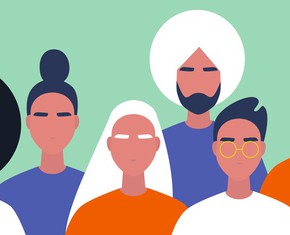The views expressed in our content reflect individual perspectives and do not represent the authoritative views of the Baha'i Faith.
Baha’u’llah, the prophet and founder of the Baha’i Faith, wrote:
Verily, I say, fasting is the supreme remedy and the most great healing for the disease of self and passion.
And Abdu’l-Baha, the son of Baha’u’llah and one of the central figures of the Baha’i Faith, wrote:
This Fast leadeth to the cleansing of the soul from all selfish desires, the acquisition of spiritual attributes, attraction to the breezes of the All-Merciful, and enkindlement with the fire of divine love… Fasting is the cause of the elevation of one’s spiritual station.
In March, millions of Baha’is all around the world will voluntarily stop eating and drinking during the daylight hours for nineteen days in a row. Why?
RELATED: How to Fast Like a Baha’i in 2021
During the Baha’i Fast, Baha’is abstain from food and drink from sunrise to sunset each day for the entire Baha’i month of Ala, which comprises the nineteen days before the spring equinox. Shoghi Effendi, the Guardian of the Baha’i Faith, explains that this annual Baha’i fast:
…is essentially a period of meditation and prayer, of spiritual recuperation, during which the believer must strive to make the necessary readjustments in his inner life, and to refresh and reinvigorate the spiritual forces latent in his soul. Its significance and purpose are, therefore, fundamentally spiritual in character.
You may not realize it, but most religions have a fasting period sometime during the year—Christians, Jews, Hindus, Taoists, Muslims and Jains all practice some variant of an annual fast. Observant Jews fast for six days, especially on Yom Kippur and Tisha B’Av; Muslims fast during the daylight hours for 30 days during the lunar month of Ramadan; Catholics fast during Lent and other holy days; different Christian denominations fast individually and voluntarily; Hindus fast at various times of the year; many Buddhist practices include fasting, as well.

So fasting has been practiced in different forms and times for millennia as part of religious life, but the principle remains the same—fasting symbolizes detachment from the physical world and from the self. Baha’is view fasting as a spiritual exercise, but recently science has shed new light on its significant role in human biology and physiology—another example of the agreement of science and religion, one of the Baha’i primary principles.
According to recent studies, intermittent fasting has significant health benefits. It promotes optimal physical health by reducing the risk of many chronic illnesses, especially for those who are overweight or obese. Based on the existing evidence from animal studies, fasting has strong effects on health indicators including greater insulin sensitivity, reduced levels of blood pressure, body fat, insulin, glucose, atherogenic lipids, and inflammation. Fasting alleviates disease processes and improves clinical outcomes in disorders such as myocardial infarction, diabetes, stroke, Alzheimer’s and Parkinson’s disease.
RELATED: When and Why Did Humans Start Fasting?
Fasting, with its general mechanism of triggering adaptive cellular stress responses, results in intensified ability to cope with more severe stress, which prevents disease processes from beginning. Fasting also protects cells from DNA damage, suppresses cell growth and enhances apoptosis of damaged cells—which consequently prevents the formation and growth of cancers. Fasting helps reduce obesity, hypertension, asthma and rheumatoid arthritis. Researchers have now begun to show that fasting even has the potential to delay aging.
With all these health benefits, is fasting difficult? Those who have fasted know that the body gradually adapts to a new routine, and under normal conditions can cope well with lack of nourishment for twelve hours. But the Baha’i teachings say that fasting may not help the healing process if a person is already ill. In some cases, such as diabetics, it would be harmful to fast. Baha’u’llah wrote:
…obligatory prayer and fasting occupy an exalted station in the sight of God. It is, however, in a state of health that their virtue can be realized. In time of ill-health it is not permissible to observe these obligations…
Baha’is fast from the age of maturity, which the Baha’i teachings say begins at 15, until the age of 70. Those who are ill, pregnant and nursing mothers, those doing heavy labor, even those travelling for a long time are all exempt from the fast.
Would you like to try fasting during the Baha’i fast this year? It could increase your physical and spiritual health, and give you a new awakening. As Abdu’l-Baha said:
Fasting is the cause of awakening man. The heart becomes tender and the spirituality of man increases. This is produced by the fact that man’s thoughts will be confined to the commemoration of God, and through this awakening and stimulation surely ideal advancements follow.
You May Also Like
Comments

















I am a diabetic but, as of now since I only take medication in the early morn and evening after meals, I try my best to do fasting from food and drink from sunrise to sunset (I hope I could carry on until its end).
http://www.sciencedirect.com/science/article/pii/S1934590914001519/
https://www.ncbi.nlm.nih.gov/pubmed/26374764
https://www.ncbi.nlm.nih.gov/pubmed/26135345
For instance, someone with diabetes can still be said to be fasting by keeping all the other relevant concepts of fasting such as the fasting prayers and introspection. It is actually REQUIRED by Baha'i Law that someone with diabetes and other medical conditions NOT physically fast.
Pretty much the same is true for pregnant woman, breastfeeding women and also those who are menstruating. And those younger than 15 and older than 70. I know ...many women who still fast during menses though and some young people who start fasting before 15 and many older people who fast long after age 70.